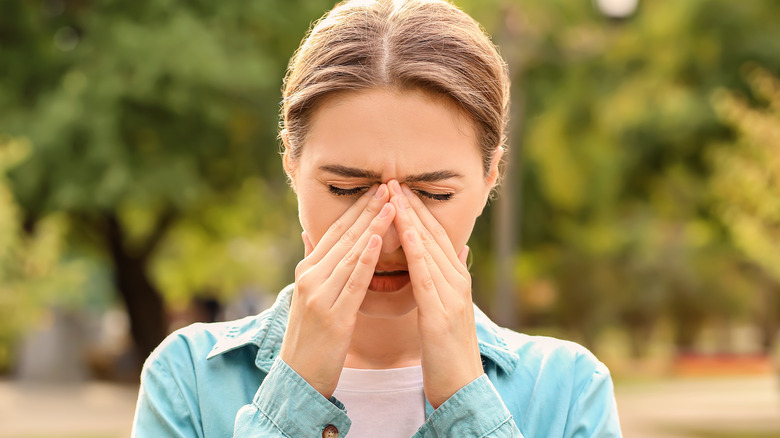Are Allergies Causing You To Feel Dizzy?
Dizziness can come on at any time, and it can be a little concerning. Although dizziness is rather common, many things can cause it. Dehydration, an ear infection, certain medications, an irregular heartbeat, low blood sugar, and anxiety all can make you dizzy.
According to Cleveland Clinic, your brain uses signals from your inner ear, eyes, muscles, joints, and skin to determine the position of your body. If any of these are disrupted, you could feel dizzy. That's why when you stand up too quickly, you might feel dizzy. There's a tube that connects your middle ear and your throat — called the Eustachian tube — that opens when you sneeze, swallow, or yawn. If that tube gets clogged, it might feel like your ears are clogged. Sounds might be muffled, and you might have problems with balance. How might your Eustachian tubes get swollen or clogged? Yep, it could be mucus or fluids from allergies.
How to treat dizziness from allergies
If you know your dizziness is allergy-related, then it's best to start by treating your allergies. Your first step may be to talk to your doctor about using an over-the-counter antihistamine to prevent your immune system from responding to what triggers your allergic reaction. If that doesn't help, your doctor could prescribe allergy shots, leukotriene receptor antagonists, or steroids that are either injected, taken orally, or sprayed in the nose, according to Healthgrades. If you aren't aware of what your specific allergy triggers are, your doctor or an allergist can run an allergy test to help you determine them. When you know what triggers your allergies, such as pet dander, pollen, or mold, you can take action to try to avoid those triggers.
It's important to note that if your dizziness is also accompanied by feeling faint, confusion, swelling, or wheezing, it could be a sign of anaphylaxis, which can be life-threatening and requires immediate medical attention.


